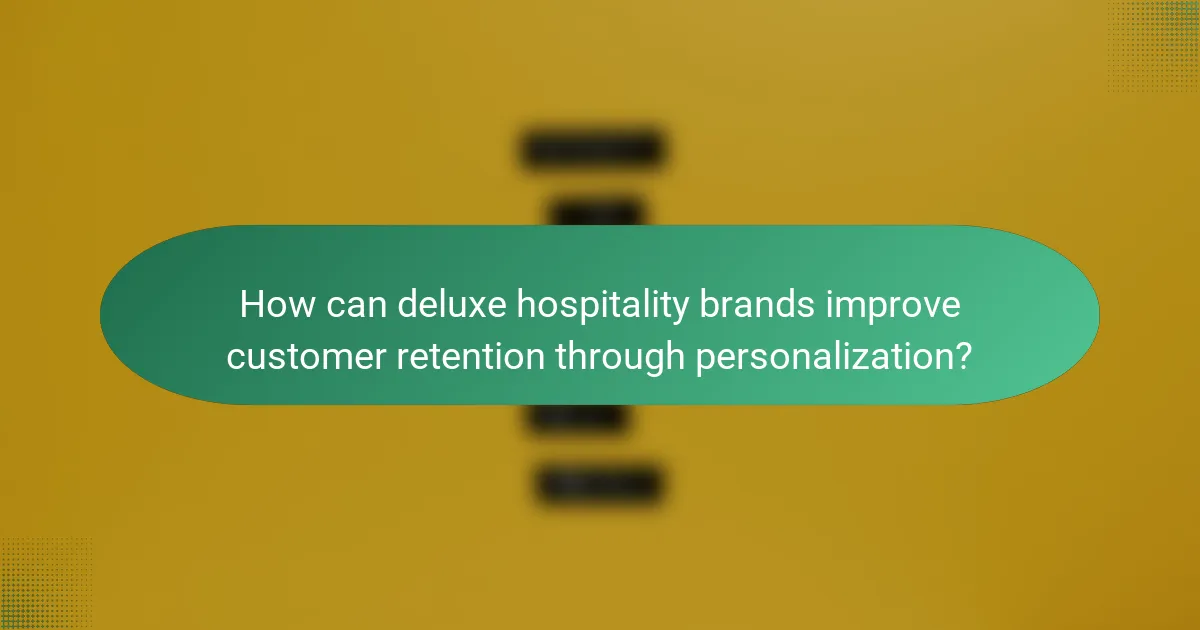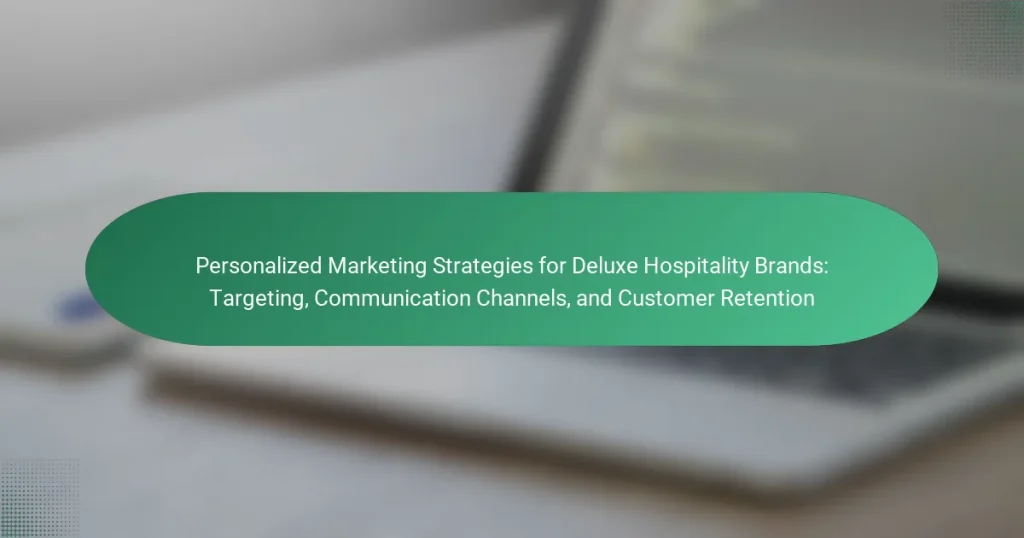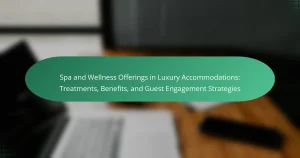Personalized marketing strategies for deluxe hospitality brands focus on tailoring experiences and communications to meet individual customer preferences. These strategies leverage data analytics to gain insights into customer behavior, allowing brands to effectively segment their audience and customize interactions. Key components include personalized email campaigns, loyalty programs, and targeted advertising on social media platforms, all designed to enhance engagement and improve customer retention. Research indicates that personalized marketing can significantly boost customer loyalty and transaction rates, making it essential for deluxe hospitality brands to adopt these tailored approaches.

What are Personalized Marketing Strategies for Deluxe Hospitality Brands?
Personalized marketing strategies for deluxe hospitality brands involve tailoring experiences and communications to individual customer preferences. These strategies include data-driven insights to understand customer behavior. Brands often utilize customer profiles to segment their audience effectively. Personalized email campaigns enhance engagement by addressing specific interests. Loyalty programs are designed to reward frequent guests with customized offers. Social media platforms serve as channels for direct and personalized interaction. Additionally, personalized content on websites can improve user experience and conversion rates. Research shows that personalized marketing can increase customer retention by up to 30%.
How do personalized marketing strategies differ from traditional marketing approaches?
Personalized marketing strategies focus on individual consumer preferences, while traditional marketing approaches target broader demographics. Personalized strategies utilize data analytics to tailor messages and offers to specific customer behaviors. This contrasts with traditional methods, which often rely on generic campaigns. For example, personalized marketing can increase engagement by 20% through customized content. In contrast, traditional marketing may see lower response rates, averaging around 1-2%. The use of advanced technology in personalized marketing allows for real-time adjustments based on consumer interactions. Traditional marketing lacks this adaptability, often leading to less effective outreach.
What key elements define personalized marketing in the hospitality sector?
Key elements of personalized marketing in the hospitality sector include customer data utilization, tailored communication, and personalized experiences. Customer data utilization involves collecting and analyzing guest preferences and behaviors. This data helps brands understand individual needs and expectations. Tailored communication refers to targeted messaging that resonates with specific customer segments. For example, personalized emails can increase engagement rates significantly. Personalized experiences enhance guest satisfaction by offering unique services based on prior stays. Research shows that 80% of consumers are more likely to make a purchase when brands offer personalized experiences. These elements work together to enhance customer loyalty and retention in the hospitality industry.
Why is personalization important for deluxe hospitality brands?
Personalization is crucial for deluxe hospitality brands because it enhances customer experience and loyalty. Personalized services cater to individual preferences, making guests feel valued. This approach leads to increased satisfaction and repeat business. According to a study by Accenture, 91% of consumers are more likely to shop with brands that provide relevant offers and recommendations. Additionally, personalized marketing can increase revenue by up to 15% in the hospitality sector. By leveraging data analytics, deluxe brands can tailor their offerings, ensuring a unique experience that meets customer needs. This level of attention fosters strong emotional connections, essential for brand loyalty in a competitive market.
What are the main objectives of personalized marketing strategies?
The main objectives of personalized marketing strategies are to enhance customer engagement and improve conversion rates. Personalized marketing aims to deliver tailored content and offers based on individual preferences. This approach increases customer satisfaction and loyalty. Data from a 2021 HubSpot report indicates that 72% of consumers only engage with personalized messaging. Additionally, personalized marketing can lead to higher return on investment (ROI). According to a study by Epsilon, 80% of consumers are more likely to make a purchase when brands offer personalized experiences. Overall, these objectives drive business growth and customer retention in the hospitality sector.
How do these strategies enhance customer experience?
Personalized marketing strategies enhance customer experience by tailoring services to individual preferences. This approach increases customer satisfaction and loyalty. By analyzing customer data, brands can deliver targeted offers and communications. This personalization creates a sense of value for the customer. Research shows that 80% of consumers are more likely to make a purchase when brands offer personalized experiences. Additionally, personalized marketing can improve engagement rates across communication channels. Enhanced engagement leads to stronger emotional connections with the brand. Consequently, customers feel understood and appreciated, which fosters long-term relationships.
What role does customer data play in shaping these strategies?
Customer data is essential for shaping personalized marketing strategies in deluxe hospitality brands. It allows brands to understand customer preferences and behaviors. This understanding enables targeted marketing efforts that resonate with specific customer segments. By analyzing data, brands can identify trends and tailor their offerings accordingly. For instance, data on past bookings can inform personalized promotions. Additionally, customer feedback data helps refine service offerings. Overall, leveraging customer data enhances engagement and improves retention rates. According to a study by McKinsey, companies that effectively use customer data can increase their marketing ROI by up to 15-20%.

How can deluxe hospitality brands effectively target their audience?
Deluxe hospitality brands can effectively target their audience through personalized marketing strategies. These brands should utilize data analytics to understand customer preferences. By analyzing past booking behaviors, brands can tailor offers to individual needs. Implementing targeted advertising on social media platforms reaches specific demographics. Email marketing campaigns can be customized based on customer profiles. Creating loyalty programs incentivizes repeat visits and enhances customer engagement. Additionally, partnerships with luxury brands can attract high-end clientele. According to a study by McKinsey, personalized marketing can increase customer engagement by 20%.
What methods can be used to identify target demographics?
Surveys and questionnaires are effective methods to identify target demographics. These tools collect direct feedback from potential customers. Analyzing customer data from existing databases also reveals demographic information. Social media analytics provide insights into audience characteristics and preferences. Market research reports offer comprehensive demographic data on specific industries. Focus groups facilitate in-depth discussions that uncover demographic trends. Website analytics track user behavior and demographics for targeted marketing. Each method contributes to a clearer understanding of target demographics, enhancing marketing strategies.
How does market segmentation contribute to effective targeting?
Market segmentation enhances effective targeting by dividing a broad market into smaller, more defined groups. This process allows businesses to tailor their marketing strategies to meet the specific needs of each segment. For instance, deluxe hospitality brands can identify segments based on demographics, preferences, or behaviors. By understanding these characteristics, brands can create personalized offers that resonate with each group. Research indicates that targeted marketing efforts can increase conversion rates by up to 30%. Moreover, segmentation helps in optimizing resource allocation by focusing efforts on the most profitable segments.
What tools can assist in analyzing customer preferences?
Survey tools can assist in analyzing customer preferences. These tools collect direct feedback from customers about their likes and dislikes. Examples include SurveyMonkey and Google Forms. Analytics platforms also help in understanding customer behavior. Google Analytics provides insights into website interactions. Social media analytics tools, like Hootsuite, track customer engagement. Customer relationship management (CRM) software aids in preference tracking. Salesforce and HubSpot are popular CRM options. Data visualization tools can present customer data clearly. Tableau and Power BI transform data into comprehensible visuals. These tools collectively enhance the understanding of customer preferences.
What are the best practices for creating customer personas?
The best practices for creating customer personas include conducting thorough research and segmenting your audience. Use surveys and interviews to gather data on customer demographics, behaviors, and preferences. Analyze existing customer data to identify trends and patterns. Create detailed profiles that include motivations, pain points, and buying behaviors. Ensure that personas are based on real data rather than assumptions. Regularly update personas to reflect changes in customer behavior or market conditions. Validate personas through testing in marketing campaigns to ensure effectiveness. These practices enhance targeted marketing efforts and improve customer engagement in the deluxe hospitality sector.
How can customer personas guide marketing messaging?
Customer personas guide marketing messaging by providing detailed insights into target audiences. These personas represent specific segments of customers based on demographics, behaviors, and preferences. By understanding these characteristics, brands can tailor their messaging to resonate with each persona. For example, a luxury hotel might create a persona for business travelers, focusing on convenience and efficiency. In contrast, a persona for leisure travelers may emphasize relaxation and unique experiences. Research indicates that personalized messaging increases engagement rates by up to 50%. This targeted approach improves customer retention and satisfaction in the hospitality industry.
What attributes should be included in customer personas for deluxe brands?
Demographic information, psychographics, purchase behavior, and brand loyalty are key attributes for customer personas of deluxe brands. Demographic information includes age, gender, income level, and education. Psychographics cover lifestyle, values, interests, and personality traits. Purchase behavior examines frequency, spending habits, and preferred product features. Brand loyalty assesses emotional connection, advocacy, and repeat purchase likelihood. These attributes help in creating tailored marketing strategies that resonate with high-end consumers.

What communication channels are most effective for personalized marketing?
Email marketing and social media are the most effective communication channels for personalized marketing. Email allows for direct, tailored messages based on customer preferences. According to a report by Campaign Monitor, personalized emails can increase transaction rates by up to six times. Social media platforms enable brands to engage with customers through targeted ads and personalized content. Research from HubSpot indicates that 80% of consumers are more likely to make a purchase when brands offer personalized experiences on social media. These channels foster direct interaction and build customer loyalty, making them essential for effective personalized marketing.
How do digital channels compare to traditional channels in hospitality marketing?
Digital channels offer more targeted and measurable marketing strategies compared to traditional channels in hospitality marketing. Digital platforms like social media, email, and websites allow for real-time engagement with customers. They enable personalized communication based on user data and preferences. In contrast, traditional channels such as print ads and television lack the same level of interactivity and personalization. According to a 2020 study by Statista, digital advertising spending in the hospitality industry reached approximately $8 billion, highlighting its growing importance. Additionally, digital channels can track customer behavior and campaign performance more effectively, providing valuable insights for future marketing efforts. This data-driven approach enhances customer retention strategies in deluxe hospitality brands.
What role does social media play in personalized marketing strategies?
Social media plays a crucial role in personalized marketing strategies. It enables brands to engage directly with customers based on their preferences and behaviors. Through social media platforms, businesses can gather valuable data on user interactions. This data helps in crafting tailored marketing messages. For instance, 70% of consumers prefer personalized ads. Social media allows brands to segment their audience effectively. This segmentation enhances targeting accuracy. Moreover, social media facilitates real-time communication with customers. This immediacy fosters stronger relationships and customer loyalty.
How can email marketing be optimized for personalization?
Email marketing can be optimized for personalization by utilizing customer data effectively. This includes segmenting audiences based on demographics, behavior, and preferences. Personalized subject lines increase open rates by 26%, according to a study by Campaign Monitor. Tailoring content to individual interests enhances engagement. Implementing dynamic content allows for real-time customization based on user interactions. Automated email triggers, such as welcome emails or abandoned cart reminders, can improve response rates significantly. Additionally, leveraging customer feedback to refine messaging ensures relevance. Personalization leads to higher conversion rates, reinforcing its importance in email marketing strategies.
What emerging communication channels should deluxe brands consider?
Deluxe brands should consider emerging communication channels such as social media platforms, messaging apps, and augmented reality experiences. Social media platforms like Instagram and TikTok allow for visually engaging content that resonates with luxury consumers. Messaging apps, including WhatsApp and Facebook Messenger, enable personalized communication and customer service. Augmented reality experiences can enhance customer interaction by allowing virtual try-ons or immersive brand storytelling. These channels are gaining traction as they cater to the preferences of tech-savvy luxury consumers. Research shows that 72% of consumers prefer personalized messaging, highlighting the importance of these channels in building customer loyalty.
How can mobile apps enhance personalized customer interactions?
Mobile apps can enhance personalized customer interactions by delivering tailored content and experiences. They utilize user data to analyze preferences and behaviors. This data-driven approach allows brands to send personalized offers and recommendations. For instance, a hotel app can suggest room upgrades based on previous stays. Notifications can be customized to remind customers of special events or promotions. According to a study by eMarketer, personalized messages can increase engagement rates by up to 29%. Additionally, mobile apps facilitate direct communication, allowing customers to provide feedback or request services quickly. This immediacy fosters a stronger customer relationship, enhancing loyalty and retention.
What impact does AI technology have on communication strategies?
AI technology significantly enhances communication strategies by enabling personalized interactions. It allows brands to analyze customer data in real-time. This analysis helps tailor messages to individual preferences and behaviors. AI chatbots facilitate instant customer support, improving engagement. Predictive analytics forecast customer needs, allowing proactive communication. Automated content generation streamlines message creation across platforms. As a result, brands achieve higher customer satisfaction and retention rates. According to a 2021 McKinsey report, businesses using AI in marketing saw a 10-20% increase in customer engagement.

How can deluxe hospitality brands improve customer retention through personalization?
Deluxe hospitality brands can improve customer retention through personalization by tailoring experiences to individual preferences. This includes utilizing data analytics to understand customer behaviors and preferences. Personalized communication, such as customized emails or offers, enhances engagement. Providing tailored recommendations based on past stays can create a more memorable experience. Implementing loyalty programs that reward personalized interactions can also foster long-term relationships. According to a study by Accenture, 91% of consumers are more likely to shop with brands that provide relevant offers and recommendations. This data underscores the importance of personalization in retaining customers in the deluxe hospitality sector.
What are the key strategies for enhancing customer loyalty?
Key strategies for enhancing customer loyalty include personalized communication, rewards programs, and exceptional customer service. Personalized communication fosters a connection with customers by addressing their specific needs and preferences. Research shows that 80% of consumers are more likely to make a purchase when brands offer personalized experiences. Rewards programs incentivize repeat purchases and encourage brand loyalty. A study by Bond Brand Loyalty found that 79% of consumers are more likely to continue doing business with brands that offer loyalty programs. Exceptional customer service creates positive experiences that lead to repeat business. According to a report by PwC, 32% of customers would stop doing business with a brand after one bad experience. These strategies collectively enhance customer loyalty and drive long-term success.
How does personalized follow-up communication affect customer retention?
Personalized follow-up communication significantly enhances customer retention. It strengthens the emotional connection between the brand and the customer. Tailored messages show customers that their preferences are valued. This can lead to increased loyalty and repeat business. According to a study by Epsilon, 80% of consumers are more likely to make a purchase when brands offer personalized experiences. Additionally, personalized communication can reduce churn rates. Brands that engage customers with relevant content see a higher retention rate. This demonstrates the effectiveness of personalized follow-up strategies in maintaining long-term customer relationships.
What role does loyalty programs play in personalized marketing?
Loyalty programs play a crucial role in personalized marketing by enhancing customer engagement and retention. These programs collect data on customer preferences and behaviors. This data allows brands to tailor marketing messages and offers to individual customers. Personalized rewards can increase customer satisfaction and loyalty. According to a study by Accenture, 75% of consumers are more likely to make a purchase when offered personalized experiences. Loyalty programs also encourage repeat business, which is vital for hospitality brands. By integrating loyalty programs with personalized marketing strategies, deluxe hospitality brands can foster deeper customer relationships. This ultimately leads to increased revenue and customer lifetime value.
What metrics should be tracked to measure retention success?
Key metrics to track retention success include customer lifetime value (CLV), churn rate, and repeat purchase rate. CLV quantifies the total revenue a customer generates over their relationship with a brand. A higher CLV indicates effective retention strategies. Churn rate measures the percentage of customers lost over a specific period. A lower churn rate signifies better retention. Repeat purchase rate evaluates how often customers return to make additional purchases. An increased repeat purchase rate reflects successful retention efforts. Tracking these metrics provides a comprehensive view of retention effectiveness in personalized marketing for deluxe hospitality brands.
How can customer feedback be utilized to improve personalized strategies?
Customer feedback can be utilized to improve personalized strategies by identifying specific preferences and behaviors. Analyzing feedback allows brands to understand customer needs better. This understanding helps tailor marketing messages effectively. For instance, feedback on service quality can lead to enhanced guest experiences. Additionally, feedback can highlight areas for product improvement. Brands can adjust offerings based on customer suggestions. Implementing changes based on feedback fosters customer loyalty. Research shows that 70% of customers are more likely to return after providing feedback that is acted upon.
What are common challenges in retaining customers in deluxe hospitality?
Common challenges in retaining customers in deluxe hospitality include high customer expectations, competition, and personalization difficulties. Customers expect exceptional service and unique experiences. Meeting these expectations consistently can be challenging. The deluxe hospitality market is highly competitive. Brands must differentiate themselves to retain customers. Personalization is crucial in this sector. However, effectively gathering and utilizing customer data can be complex. Additionally, maintaining customer loyalty is difficult in a transient market. Many customers frequently seek new experiences, making retention a continuous challenge.
What practical tips can deluxe hospitality brands implement for effective personalized marketing?
Deluxe hospitality brands can implement several practical tips for effective personalized marketing. First, they should utilize customer data analytics to understand preferences and behaviors. This can include tracking past stays, dining preferences, and special requests. Second, brands should segment their audience for targeted marketing campaigns. Tailored messages resonate more with specific groups, increasing engagement. Third, personalized communication is essential. Brands should use the customer’s name and reference past interactions in emails and messages. Fourth, leveraging loyalty programs can enhance personalization. Offering exclusive deals based on previous visits builds customer loyalty. Fifth, brands should invest in technology for real-time personalization. Chatbots and AI can provide tailored recommendations instantly. Lastly, soliciting feedback helps refine marketing strategies. Understanding customer satisfaction can lead to improved services and targeted promotions. These strategies have been shown to increase customer satisfaction and retention in the hospitality industry.
Personalized marketing strategies for deluxe hospitality brands focus on tailoring experiences and communications to individual customer preferences using data-driven insights. The article outlines the differences between personalized and traditional marketing approaches, highlighting key elements such as customer data utilization and tailored communication. It emphasizes the importance of personalization in enhancing customer experience and loyalty, detailing methods for effective audience targeting, communication channels, and the role of customer feedback in refining strategies. Additionally, it discusses the significance of loyalty programs and metrics for measuring retention success in the competitive deluxe hospitality sector.




